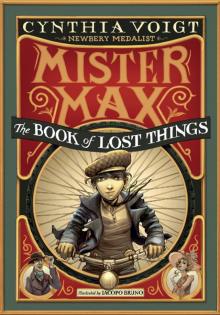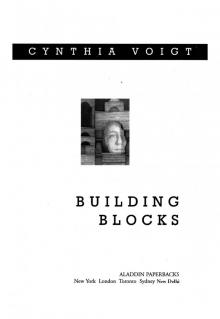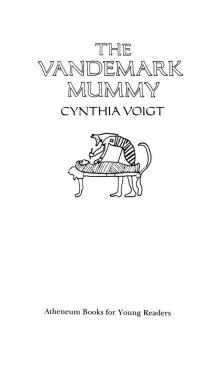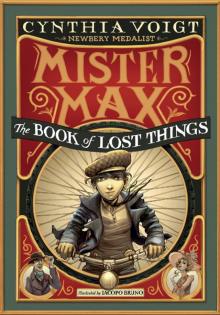- Home
- Cynthia Voigt
Izzy, Willy-Nilly Page 13
Izzy, Willy-Nilly Read online
Page 13
We talked about safe things, until Rosamunde got up to go. Then she asked me, as she was snapping her jacket, which wasn’t necessary because it wasn’t even cool in the hospital, “What did happen, with Marco?”
“Why do you want to know?”
She shrugged.
“I can’t remember,” I said.
Rosamunde looked down at me. “You’re lying.”
I didn’t know what to say.
“That’s okay, I mean, you can trust me with the truth if you want to, but you don’t have to. Do you want me to tell my father you still can’t remember?”
“Why should you do that?”
“He’s a policeman. They were going to come back, when you were stronger, to get a report from you.”
“I didn’t know your father was a policeman.”
“He’d know you’re lying. Your eyes get—they kind of give you away. But I’ll tell him so you won’t have to lie, and I won’t be lying. I can say you said you couldn’t tell them anything more than you already have.”
That was so precisely and exactly true, I felt like thanking Rosamunde. She had given me something to say that wasn’t a lie. I didn’t like lying, and she was right—I wasn’t any good at it.
“If you would—I’d be so—”
“No problem.”
“That’s what PAL stands for, isn’t it? Police Athletic League.”
“You could say that. I like to think it stands for pal, you know, good buddy and all.”
Thursday night I called Lisa and Suzy, to tell them I was going home. They sounded pleased. They both said they’d see me, and that pleased me. I didn’t like the way me being in the hospital had broken us up. I’ll have to ask Mom to keep in a good supply of drinks, I thought, and chips, and pop-corn. For when there’s company, since I won’t be able to go out for a while.
And I did finally ask the black nurse her name, because of what Rosamunde said. I had to work up my courage, because she didn’t talk to me and I didn’t talk to her. But when I was saying good-bye, I asked her: “I never knew what your name is.”
“Adelia,” she said. At least, I had surprised her into really looking at me, as she pulled the sheet back up over my lap. “It’s not like you’re through with me,” she said. “We’ve got weeks of work ahead.”
“Oh,” I said.
“Adelia Jones,” she said.
“I guess I’ll be seeing you, Miss Jones,” I said.
“Mrs.”
But she didn’t wear a wedding ring. I wondered why she didn’t. I wondered what would happen so that a woman wouldn’t wear a wedding ring but would still call herself Mrs. I looked at her, strong and square, her dark skin showing chocolate brown in contrast to the fresh white uniform, and I tried to see past the color of her skin to who she really was. But I couldn’t.
Friday afternoon, waiting for my parents, I almost couldn’t stand it. My mother had emptied the room the night before so all we had to take with us was an overnight bag. The bag was by the door. I was dressed in a skirt and blouse and sweater, dressed for the first time in weeks. I had moved myself to the chair and sat waiting.
The room was empty, like a bare cupboard. The bed was empty but not yet stripped. I looked at the bed.
I’ll have to practice on stairs, I thought. Once the cast comes off and I can go back to my own room, it’ll be hard work getting up the stairs.
I was finished with the hospital. I had served through, like an indentured servant, or someone just about to get out of jail. Every minute I waited felt a week long.
There won’t be much privacy downstairs, I reminded myself and then I realized, I’ll need a place to do my home-work. I was going to have an awful lot of school work to catch up on.
After the cast came off, Dr. Epstein had told me, they would give me crutches.
I heard voices in the hall and my heart beat a little faster, but it wasn’t my parents. “As soon after lunch as we can,” my mother had promised me. I made myself sit patiently, although the nerves just under the skin of my hands made my fingers want to jump. The time in the hospital was already slipping away from me, and I was glad to have it do that. I just wanted to get out. I just wanted to be home. I just wanted—things to feel all around me the way they would feel as soon as I was home again.
I should have known better. I should have learned by then, but I hadn’t. I shouldn’t have expected anything. If I had to expect something, I should have been more realistic about my expectations. But I was like a little kid, about to turn a year older, waking up on her birthday morning and thinking the whole world was going to be different, better. The miniature Izzy inside my head was standing there, holding on to a big red balloon that floated above her head. She let the balloon go, to see it fly up and away; but she hadn’t realized that in order to let it go she was going to have to lose it too.
* * *
They wheeled me down to the elevator and then through the lobby; my father shifted me to the front seat of our station wagon; we drove away from the hospital and through town, then out of town and into the hilly countryside.
The area where we live is called Westwood, because the original estate belonged to a family named West. All the houses were built at about the same time, in the late forties. Our house faces the road squarely. It has a first floor longer than the second, and it is only one room thick, so that every room looks out on trees and grass. The driveway goes by the front door before turning behind to the white clapboard garage that matches the house exactly, even to the slate tiles on the roof and the gunpowder gray shutters on the windows. My father pulled up in front. My mother opened the door for us, while he helped me up the steps with his arm around my ribcage, lifting me. “Ready? Up now. Ready? Up again.”
I stood within the circle of his arm as my mother closed the front door behind us. The soft green carpet under my feet; the long beige curtains on the windows with the trim my mother and I had searched for for weeks; the wallpaper, its ivory background traced over with soft green fern fronds, the polished wood of the banister, which matched the wood of the entryway table, where a bowl of cut flowers sat—I was home.
I breathed in the quiet, the colors, the smell of wax and flowers. I relaxed, all down my bones and in my head and heart. Leaning against my father’s tall, strong body, I smiled to myself.
My mother left us and came back carrying a walker. The four tubed legs of the thing were tipped with white rubber. “We got you this and we’ve rented a wheelchair, but that’s in the kitchen. I think it’ll take some practice.”
I looked at the gleaming metal and the curved bars that made railings, joining the four legs. My smile slipped away.
“And wait until you see what we’ve done—”
“What your mother’s done,” my father corrected.
The walker waited, like half a cage.
Clumsily, I unzipped my jacket and worked my arms out of it, while my father held me steady. Then I pulled the walker toward me until I stood inside it.
My father was staring at me. I had no idea what he was thinking.
“Shall we?” my mother asked. I didn’t know how I was going to manage the stairs.
But she led me down the hall and into their bedroom. I followed her, slowly and clumsily.
She had turned their bedroom into a girl’s room. New curtains hung over the windows and the same print made a quilt to cover their big bed. New bookcases were in the room, filled with my books and stuffed animals. My own pictures hung on the walls. All of their personal items were gone. In the bathroom, my towels hung on the racks and it was my bathrobe that hung behind the door. My mother’s desk had been cleaned off and my own desk lamp was on it. I knew that if I opened the drawers I would see stacks of lined paper, ball-point pens, and sharpened pencils.
“But what about you?” I asked my mother.
“We’ve moved upstairs.”
“But my room’s too small for you.”
“Well, I’m using the boys’ room for
work, all my sewing stuff’s in there, and we have all three closets for our clothes, which is more than enough.”
“What about Christmas?”
“We’ll worry about that when it comes along.”
“Or Thanksgiving.”
“We’ll get through that, somehow. Do you like it?”
I didn’t know what to say. I didn’t like it, no, because it wasn’t what I had imagined. But my imaginings had been unrealistic. I thought it was terrific, the trouble she had gone to, the details she had thought of. “I’d sort of thought I’d move into the den, for a while. This is—much nicer.”
“We thought—it’s going to be hard enough, this at least could be made easier,” my father said.
I knew that. And I knew also that this was as hard on them as it was on me. I suspected then that they had known how I would feel, about coming home, and how I would be disappointed. Because I was disappointed, and it wasn’t anything to do with home and I knew that, but I was still feeling disappointed with home.
“Do you like the room?”
“Yes,” I told her, because I did. “In fact, I think I might like a nap. I don’t know why, but I’m kind of tired.”
“Of course, you are,” my mother said, whizzing into action. “I wouldn’t even bother getting undressed, just lie here on top of the quilt; here are the pillows. Hendrik, let’s leave Izzy to have a nap. Francie’s going to insist on seeing you the minute she gets home,” my mother warned me. “I’ll make sure you’re awake, shall I?”
“Thanks. And I really am glad to be home.”
“I know, Lamb,” she said. “I know how you feel.”
Maybe she did, I thought, lying on the bed, staring at the window of the strange new room.
11
We waited for Francie in the kitchen. I sat in the wheelchair, which was narrow and lightweight; a heavy plaid blanket covered my legs. I had a cup of hot chocolate, made from scratch. My parents drank tea.
“You should take more afternoons off,” my mother said to my father.
“It’s certainly a different world, the afternoon not in an office.” He smiled at us across the round wooden table. “I’m not sure I have enough to do at home to take the afternoons off.”
“We’d find things,” my mother promised him. She was thinking of all the long-range projects they occasionally tried to get around to, the building of a workroom in the cellar and shelves for the books in the attic, the vegetable garden they talked about every spring but never put in.
“How does it feel to be home, Angel?” she asked me.
“Pretty good. But a little strange.”
“Strange?” my father asked.
“I never realized how big the rooms in this house are. Then, you’ve changed some things. Like—” I looked around the kitchen, across the sand-colored no-wax floor and beyond the white formica counters to the door into the dining room. “Like that door.” They had taken down the heavy swinging door, even removing the fat hinges it hung from. The door frame had been filled in and repainted, so it looked as if there never had been a door there.
“We thought, until you get steadier on your feet, it would be too much of an obstacle,” my father explained.
“I know that, but it’s different. Who built that shelf by the tub in your bathroom?”
“Mr. Katz. You know that, he does all our plumbing.”
“I didn’t know he could do work like that.”
The shelf was made from tiles and looked like part of the original wall. There was no way to make the long metal bar that had been put in so that I could haul myself out of the tub look like anyone’s idea of a design feature, but the shelf actually looked nice. Lined up on it were my favorite shampoo and conditioner, the glycerine soap that’s better for my skin, and a jar of bath beads.
“Mr. Katz enjoyed the work,” my mother said. “I’m surprised we hadn’t thought of it years ago, aren’t you, Hendrik? It’s so convenient, everything right there at hand and deep enough so things won’t fall off.”
Every room I looked at had changes in it, like the carpeted ramp going down the two shallow steps into the living room, or the sixth chair for the table we sat at, which had been whisked away out of sight somewhere to leave a space for the wheelchair. “You’ve been busy.”
“Mostly your mother,” my father said.
“Oh, well, you knew there had to be good reason to keep me from spending all day with you, Lamb. Do you mind the changes?”
“No,” I said. But yes, I did mind; I minded things being different when I wanted them to be exactly the same; I minded the guilty feeling I was having, for having caused all the changes. “What have you done with this chair?”
“It’s in the attic,” my father said, “just until you get the cast off. That bedroom,” he told me, “is only yours temporarily too, so enjoy the luxury while you’ve got it.”
For some reason, I was glad to hear him say that.
“It’s so good to have you home,” my mother said. But it was my father’s hand she reached for across the table. She looked at my face. “You’ve done your eyes again. I almost forgot what you look like, with your eyes done. And lipstick too; that looks nice, Izzy.”
“But my eyes don’t?” I challenged her.
“It’s funny, I never noticed it at the time, but I guess I got used to seeing your eyes without any makeup.”
“I have light lashes,” I reminded her.
“Ummnn,” she said. I had her full attention now. “You know, I noticed, when you weren’t wearing anything on your lashes, that they’re rather lovely, your lashes. Because of the way the tips are gold.”
“You have to be about an inch away to even see them.”
“Ummnn,” she said. “I was thinking—”
“Uh-oh,” I said to my father.
“That there are some girls—women—who sort of—put it all out on display.”
“The trashy example,” I said to my father.
“I’m not sure,” he said. “It could be the woman-of-mystery example.”
“If you two would listen, instead of telling me what I’m going to say, which I’m not going to say anyway,” my mother interrupted. “What I was thinking was, there are some girls, or women, who the more you look at them, the more you see of how attractive they are. As if you were discovering it instead of being told it. Which makes it, somehow—oh, I don’t know,” she said, over our laughter.
Francie ran into the room. A cold draft blew in with her and she slammed the door shut. She rushed toward me and then stopped dead in her tracks, staring. For a second, I didn’t know why she was staring. For a second, I had forgotten.
“Hi,” Francie said. She stood there, in jeans and a vest. “You got home all right.”
“What does it look like?” I asked her, staring back.
Francie is tall and skinny, with long legs. She wears her hair in one long braid down her back, except when she’s doing gymnastics when she pins the braid at the back of her neck. She went to hang up her vest. The shirt she wore that day had “In training for’92” on it.
My mother heated up the hot chocolate, to pour a mug for Francie and to refill mine. Francie made herself a jam sandwich with mayonnaise, her usual snack, and sat down. “I don’t have any homework this weekend.”
It seemed like a long time since I had seen Francie, a long time since she had sat at the table with me. Her face is round, with rounded cheeks, and her eyes are round and deeply lidded, with dark eyelashes thick around them. She talked on about the news of the day, how she had done on the spelling test and the math quiz, how strict the teacher was with her especially. Francie’s nose doesn’t belong on a child’s face. It’s too bony, it has too much character for a kid. My mother always said that Francie was going to be better looking the older she got.
“Wanna see what I can do now, Izzy?” Before I could answer, Francie hopped up from the table.
“Not in here, Love,” my mother said, as usual, and as usual Fra
ncie just ignored her. Francie took a running start and then did a cartwheel that turned into a somersault. Her skinny legs moved over her head with clockwork precision, and her whole long body tucked up into the somersault fluidly, without any hesitation. She ended up on her feet, her arms stretched behind her.
“Very nice, dear,” my mother said.
I thought they should enforce what they said to her. She knew she wasn’t supposed to practice in the kitchen, she knew because they had told her and asked her, time after time. She sat down again, waiting for me to speak my turn.
“Very nice,” I echoed my mother.
“Since it’s a special occasion, can we watch cartoons? Since Izzy’s home.”
“You’re suggesting that a good way of celebrating is to watch cartoons?“ I didn’t try to hide my sarcasm.
“Just because you don’t like them,” she muttered into her mug. “Besides, I already said we should have a party and invite my friends and your friends and their friends, but they said we ought to let you get used to things for a while. They said you’d be self-conscious. Are you?”
“Yes,” I said. The little Izzy inside my head hauled off and punched Francie in the mouth.
“Everything’s changed upstairs,” Francie said, sipping at her cocoa. “Mommy’s sewing machine is in the twins’ room and she’s jammed the beds together against the wall, and I have to wait for Daddy to get out of the bathroom, every morning, every single morning.”
“You’re closer to us when you have bad dreams,” my father reminded her.
“And they catch me if I’m reading late,” she continued her catalogue of woes.
“I think Francie should be allowed to watch cartoons,” I said. “Since it’s a special occasion.” I didn’t want to listen to her complaints about everything that had gotten worse because of me.
“So do I,” my father said. “You go ahead, Francie.”
She jumped up from the table, her face perfectly happy. “Gee, thanks, Izzy. This is great. I’m really glad you’re home,” she added, hurrying out to the den. She turned around to ask me, “Do you want to watch with me?” but didn’t wait for my answer.

 The Runner
The Runner By Any Name
By Any Name Bad Girls, Bad Girls, Whatcha Gonna Do?
Bad Girls, Bad Girls, Whatcha Gonna Do? Mister Max: The Book of Lost Things: Mister Max 1
Mister Max: The Book of Lost Things: Mister Max 1 The Wings of a Falcon
The Wings of a Falcon Bad Girls in Love
Bad Girls in Love Toaff's Way
Toaff's Way Building Blocks
Building Blocks Orfe
Orfe Tell Me if the Lovers Are Losers
Tell Me if the Lovers Are Losers It's Not Easy Being Bad
It's Not Easy Being Bad The Book of Kings
The Book of Kings Dicey's Song
Dicey's Song A Solitary Blue
A Solitary Blue Tree by Leaf
Tree by Leaf Sons From Afar
Sons From Afar Teddy & Co.
Teddy & Co. Jackaroo
Jackaroo Elske
Elske Izzy, Willy-Nilly
Izzy, Willy-Nilly Come a Stranger
Come a Stranger Mister Max: The Book of Secrets: Mister Max 2
Mister Max: The Book of Secrets: Mister Max 2 Seventeen Against the Dealer
Seventeen Against the Dealer The Callender Papers
The Callender Papers The Vandemark Mummy
The Vandemark Mummy Tale of Birle
Tale of Birle Glass Mountain
Glass Mountain The Tale of Oriel
The Tale of Oriel The Book of Lost Things
The Book of Lost Things The Book of Secrets
The Book of Secrets Tale of Gwyn
Tale of Gwyn